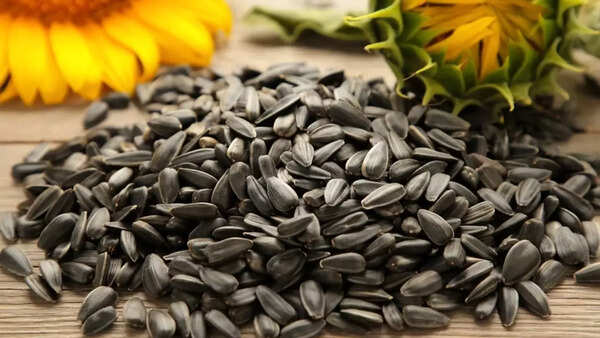Sunflower seed benefits: zinc, high in magnesium, and mood-lifting benefits |

Sunflower seeds, often ignored as a crisp snack, are nutritional powerhouses that provide numerous health benefits from mood regulations to heart health. Rich in essential minerals such as zinc and magnesium, these small seeds play an important role in supporting various physical functions including immune health, mood regulation and overall well -being.In fact, sunflower seeds are often considered superfood due to their rich nutrition profile and many health benefits.Whether it is sprinkled on a salad, mixed in a smoothie, or enjoyed on its own, sunflower seeds are a delicious and healthy extra for any diet. Including sunflower seeds in your daily diet can provide a natural source of essential minerals such as magnesium and zinc, which contributes to overall well -being.
Nutrition profile of sunflower seeds:
A 1-ounce (28-gram) dry-roasted, unresolved sunflower seeds almost provides the service of kernels:Calorie: 165Protein: 6 gramsFat: 14 grams (mainly healthy unsaturated fat)Fiber: 2.5 gramsMagnesium: about 91 mg (about 22%of daily recommended intake)Zinc: approximately 1.8 mg (about 16%of daily recommended intake)Vitamin E: About 10 mg (about 67%of daily recommended intake)Selenium: Around 8 McgB vitamin: including B6 and FolateThese values may vary slightly depending on the specific variety of seeds and preparation method.
Magnesium in sunflower seeds:
Magnesium is an important mineral involved in more than 300 biochemical reactions in the body, including nerve function, muscle contraction and energy production. Decreased magnesium has been associated with symptoms of depression and anxiety. Sunflower seeds are an excellent source of magnesium, which makes them a valuable addition to diet for those who improve their mental health. Regular consumption of sunflower seeds such as magnesium -rich foods can help regulate neurotransmitters such as serotonin and dopamine, which are important for mood stabilization.

Zinc in sunflower seeds:
Zinc is an essential trace mineral that supports immune function, protein synthesis and wound healing. It also plays a role in reacting to the reaction of the brain and body in stress. Sunflower seeds provide a good amount of zinc, which improves immune protection and mental flexibility. Adequate zinc intake is associated with low risk of depression and anxiety, highlight the importance of this mineral in maintaining mental health.
Additional health benefits of sunflower seeds:
Heart Health: Sunflower seeds, especially in unsaturated fats in linolic acid, can help reduce the level of LDL (poor) cholesterol and reduce the risk of heart disease. Additionally, seeds contain phytosterol, compounds that further support heart health. Bone strength: Magnesium, phosphorus and calcium present in sunflower seeds contribute to maintaining strong bones and preventing conditions such as osteoporosis. Skin Health: Vitamin E, a powerful antioxidant found in sunflower seeds, helps the skin to prevent oxidative stress and premature aging. It also supports wound healing and skin cell regeneration. digestive Health: The fiber content in sunflower seeds performs AIDS in digestion by promoting regular bowel movements and preventing constipation. A healthy digestive system is also associated with better mental health, as the intestine-brain connection plays an important role in mood regulation.

How to include sunflower seeds In your diet:
Adding sunflower seeds to your diet is simple and versatile:As a breakfast: Enjoy a handful of raw or roasted sunflower seeds in the form of a satisfactory snack.In salads and yogurt: Sprinkle sunflower seeds over the salad or mix them in yogurt for added crunch and nutrition.In smoothie: Blend sunflower seeds in smoothie to promote a protein and nutrients.In baking: Include sunflower seeds in muffins, bread, or granola bar in cooked goods.Sunflower seeds as butter: Use sunflower seeds butter on toast or as a dip for fruits and vegetables.
Caution word:
While sunflower seeds provide many health benefits, it is important to consume them in moderation. They are calorie-humor, and excessive intake can lead to weight gain. Selection for unsalted varieties can help manage sodium intake. Additionally, persons with sunflower seeds allergies should avoid them.




